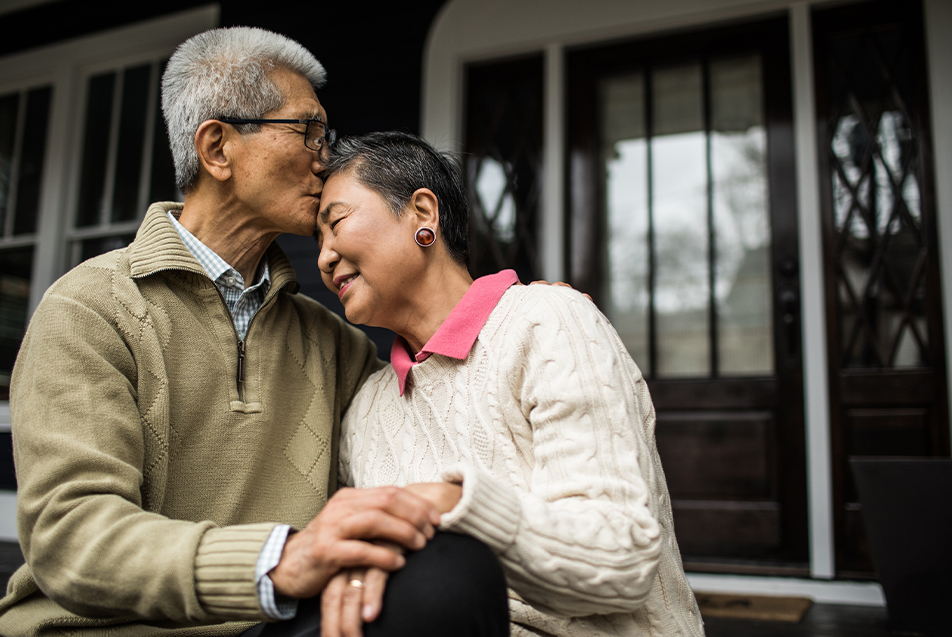
End-of-life conversations are never easy, but they are necessary. Whether it’s you or a loved one facing mortality, knowing how to handle these situations can make all the difference. To help navigate these difficult discussions, we asked Cathy Petrie, LCSW, hospice bereavement counselor, Parkview Home Health & Hospice, to answer our questions on how to address these emotionally charged conversations successfully.
What is an end-of-life conversation?
An end-of-life conversation isn’t solely about dying. It is a discussion of how you or a loved one wants to live during the last months, weeks and days. While these conversations look different for everyone, patients and family alike, engaging in them helps us value the individual and the purpose and meaning of their life.
Why are they so important?
End-of-life conversations are the perfect time to share what’s in and on the heart. These conversations help plan and calm down the fear of the unknown. Having a meaningful discussion about someone’s end-of-life choices may even help loved ones move through the grieving process a little easier. Facing the issues and having the conversation before a medical crisis occurs is essential, so major decisions aren’t being made or influenced by stress and fear. Instead, they are based on what the patient values most.
What’s the best way to approach the subject, and who should be involved?
In most cases, it’s important to let the patient take the lead. They will be the best at relaying their wants and needs as they prepare for their final days. As a hospice team, we encourage discussions, questions and time together throughout the process. Some patients and families want individual time to share personal thoughts while others choose to reminisce as a group. Whatever they choose, it’s important to remember that everyone’s experience is different and adhering to their preferences is vital. Additionally, most patients will choose to involve their family in the discussion, but some will also invite friends, caregivers, doctors and spiritual leaders into the conversation.
How can patients and loved ones prepare for this type of conversation?
Don’t put a lot of pressure on yourself. We’re all caught off guard in one way or another by death. You don’t have to come into this like an expert. Instead, be yourself. Come with an open mind and heart and an attitude of support and love. There’s no right or wrong way, as long as you’re talking about and sharing what’s important.
With that said, patients can prepare by expressing their wishes in styles that best suit them. This preparation could include verbal conversations (individually or in a group), written letters, recorded comments, or even a video of their appreciation of their past, current care, or hopes and wishes for their family’s future.
Loved ones can also relay their preferences by recognizing their personality style. Some individuals will look for an opportunity to be alone, while others will encourage a family group. No matter what each person chooses, be sure you treat each other with respect during this emotional time.
As a hospice team, we do our best to prepare patients and families for the emotional aspects of these discussions. We also like to educate them on the dying process and physical changes they might encounter as their loved one’s health declines. We hope that this education helps answer their questions and calm their fears of the unknown.
There are also a few books that can assist patients and families in their preparation for end-of-life discussions. The first being, “How to talk with sick, dying, and grieving people: When there are no magic words to say,” by Reverend Patrick Riecke, director, Chaplaincy and Volunteer Services, Parkview Health. We find the section on advance care planning to be very helpful for many people. The second book is “The Four Things that Matter Most,” by Ira Byock, M.D. In it, he suggests four simple phrases, “please forgive me,” “I forgive you,” “thank you,” and “I love you,” for people to utilize to help resolve relational difficulties and let go of toxic emotions.
What specific topics could be discussed during an end-of-life conversation?
The patient and family typically generate topics, but several items would be good to cover. Some of those items could include:
- Patient’s preferences for healthcare they want to receive or not receive
- Designation of caregivers and primary decisions makers who will carry out the choices made on their behalf and put them in writing
- How, when and where they want to spend their final days (home, nursing facility, etc.)
- A review of life so the patient and loved ones can celebrate and affirm their memories
- Financial affairs, estate planning and more
We also encourage thinking about the different ways to say goodbye and taking the time to appreciate the patient's past and present while acknowledging the future and what it will look like once they are gone.
What are some barriers people may experience to end-of-life conversations?
There are many barriers that patients and loved ones may experience when having an end-of-life discussion. Some of the most common recurrent issues include:
- A limited amount of time
- A lack of clarity on who should initiate/facilitate the conversation
- Uncertainty regarding the appropriate timing for the discussion
- Fear that the discussion might be uncomfortable
- Disagreements or estrangements between family members and the patient
What should people avoid when bringing up end-of-life?
It’s best if those involved refrain from arguing. Some differences may never be resolved, so let it be. Instead, apologize or share forgiveness, as long as it is sincere. Find ways to appreciate each other and the time you have left.
Also, a hurried attitude or agenda could have a negative impact on the conversation as well. Try not to steer or direct the patient and other family members to say or commit to ideas they do not agree with or share. Instead, keep an open mind and heart, and listen.
What are some ways to overcome these barriers?
In some cases, having a neutral person present during the conversation encourages respectfulness. Death can bring out many emotions, including a fear of the unknown, which is why attitudinal awareness during these discussions is essential.
Additionally, the tone a family brings to the table helps set the direction for both light and deep conversations in which the patient should feel comfortable expressing their wants and needs. It's also important to remember that the silence of holding hands or sitting together is just as powerful as a conversation and can convey meaning that is more reassuring than words. For example, dementia patients are sensitive to emotions, so merely being with them can speak volumes compared to anything you might say.
Final thoughts
Be sure to make time for the conversation. Don’t let the death crisis overshadow the time you have left to share and enjoy life together. To help facilitate this time, here is a framework for ways to honor a loved one at the end of their life:
- Be sure to show and tell the patient how their life was meaningful and had a purpose.
- Assist in the completion of their bucket list if someone or something is requested.
- Ask staff to answer any questions the patient or loved ones may have about the dying process and experience.
- Celebrate any holidays, anniversaries, birthdays or special occasions early.
- Participate in rituals of sacred prayers or other religious activities.
- Enjoy every moment and show love.
- Make plans and decide who will be there for family support and managing the estate.
- Permit family members to be free and live their lives after the death of the patient.
Helpful end-of-life support and resources
Websites
NIH’s National Institute on Aging
Books
How to Talk with Sick, Dying, and Grieving People: When There are No Magic Words to Say by Reverend Patrick Riecke
The Four Things that Matter Most: A Book About Living by Ira Byock, M.D.



